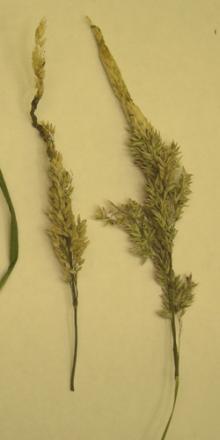Cause A fungus, Dilophospora alopecuri, that infects fine fescue and overwinters in infested residues or soil and may be seedborne. Dark colored fruiting bodies (pycnidia) develop and aggregate between veins on older leaves and leaf sheaths. Conidia are produced and dispersed by rain splashing.
Symptoms Twisted or malformed seed heads. Portions of shoots or leaves may be enveloped with a black fungal stroma. In some cases white, deformed or twisted heads may emerge from the boot. Somewhat resembles leaf smut.
Control The disease is more common in low value range grasses and has not been a problem in commercial seed production fields in Oregon.
Reference Richardson, M.J. 1979. An annotated list of seed-borne diseases, 3rd Ed. Commonw. Mycol. Inst., Kew, Int. Seed Test. Assoc. Zurich.


